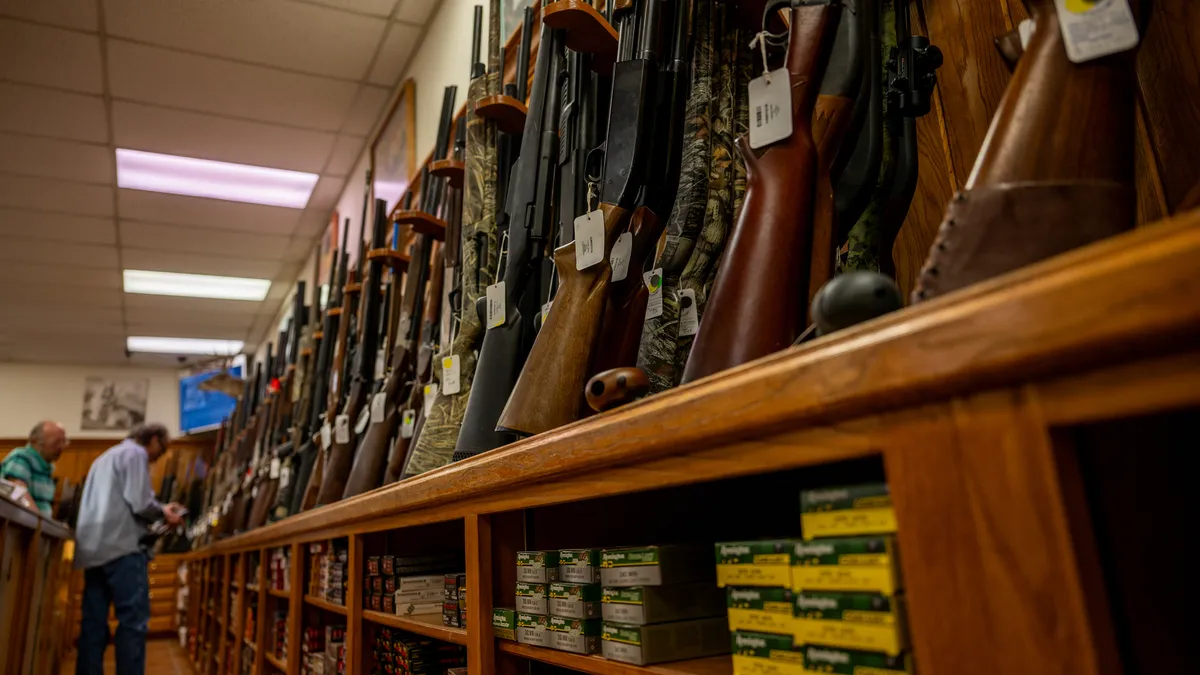Dive Brief:
- Colorado legislators have introduced a bill that would require use of a firearm merchant category code, following California’s move last year.
- Colorado Senate Bill 24-066, introduced Jan. 22, would require “certain networks that facilitate payment transactions” to make the code for guns and ammunition available to merchant acquirers processing transactions for gun merchants. “A processor must assign the code to each firearms merchant to which the processor provides services,” the bill states.
- The bill would give Colorado’s attorney general enforcement authority, and violations could carry penalties of up to $10,000, according to the bill text.
Dive Insight:
The bill’s Democratic sponsors, state Sen. Tom Sullivan and state Rep. Meg Froelich, said Tuesday they have been in contact with anti-gun violence organization Brady. That non-profit group approached California legislators with the idea for the bill in that state.
“A lot of the language and the steps that were taken are a direct reflection of what they did in California,” Sullivan said of Colorado’s bill. A representative for Brady wasn’t immediately available for comment.
California Gov. Gavin Newsom signed the bill into law last September; it took effect Jan. 1, although card networks and merchant acquirers have more time to comply with the law.
The gun merchant category code was approved by the International Organization for Standardization in September 2022 and published last February, but it’s become a politically fraught issue for the card networks. They all backed off implementation of the code last year after Republican politicians took aim at it.
Froelich and Sullivan pointed to mass shooters who have spent tens of thousands of dollars on guns and ammunition, and the potential for the merchant category code to alert law enforcement to suspicious purchases before deadly shootings occur. Sullivan’s son, Alex, was one of the 12 people killed during the 2012 Aurora, Colorado movie theater shooting.
Colorado has put in place measures aimed at addressing gun violence, including enacting a three-day waiting period for firearm delivery, Froelich noted. The lawmakers are optimistic about the bill’s chance of passage, given Democratic control of both chambers of the state’s general assembly and the governor’s office. The gun merchant category code “is an important tool for us to identify folks who have made various purchases,” Froelich said.
Sullivan and Froelich said they don’t expect opposition from the banking and credit card industry. Spokespeople for card networks Visa, Mastercard, American Express and Discover Financial Services didn’t immediately respond to requests for comment.
The Colorado bill is scheduled for a Senate committee hearing on Feb. 8.
Meanwhile, a number of states are considering legislation that would ban use of the code, including New Jersey, Wisconsin, Utah, Georgia and Kentucky.
The National Shooting Sports Foundation expects other states to introduce similar bills, and also awaits the introduction of related federal legislation in the coming weeks, said Mark Oliva, who is managing director of public affairs for the trade association.
“Barring the use of a firearm-retailer specific Merchant Category Code is critical to ensuring the privacy of firearm and ammunition purchasers,” Oliva said in an email.
Last year, Texas, Florida, Mississippi, Idaho, West Virginia, North Dakota and Montana all passed legislation related to blocking use of the code. The language in the state laws varies, but they generally ban financial institutions from requiring a specific code be applied to firearms merchants.












